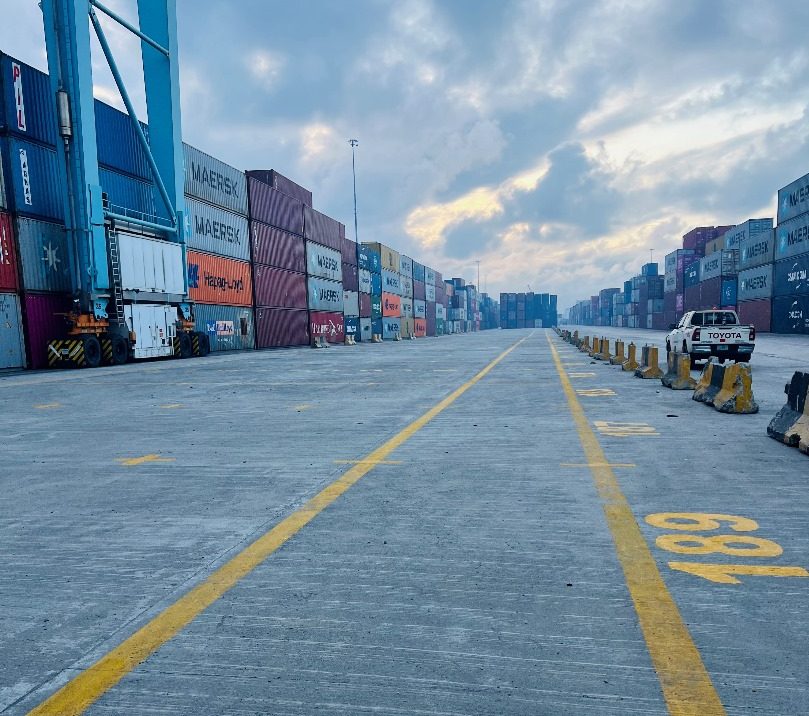Photo caption: The newly expanded container yard capacity to boost non-oil exports at APM Terminals Apapa.
The Sea Empowerment and Research Centre has urged APM Terminals Apapa to stop receiving empty containers until the existing stock is cleared to prevent further congestion.
This was contained in a report on Monday by the group signed by its Head of Research, Mr Eugene Nweke, tagged ‘Sea Empowerment Research Centre proffers workable solutions to the logjam between terminal operators and shipping lines in the Nigerian shipping space’.
This is coming days after the Terminal Manager of APM Terminals Apapa, Steen Knudsen, announced that the terminal has temporarily restricted the reception of additional empty containers until the existing stock is cleared by shipping lines.
The PUNCH reported last week that Knudsen, while responding to recent concerns surrounding the congestion of empty containers at its terminal and setting the record straight on the root causes of the situation and APMT’s efforts to resolve the issue promptly, announced that the terminal has temporarily restricted the reception of additional empty containers until the existing stock is cleared by shipping lines.
Speaking further, Nweke stated that the SEREC report offers solutions to resolve the logjam at APMT Apapa and improve the efficiency of shipping activities in Nigeria’s shipping space.
According to Nweke, the short-term solution involves ensuring the prompt discharge of incoming laden containers while collaborating with shipping lines to evacuate empty containers.
“Limit receiving empty containers until existing stock is cleared to prevent further congestion. Provide regular updates to landside customers, truck operators, and stakeholders on backlog clearance progress,” Nweke said.
He maintained that for the terminal to ensure a long-term solution to the problem, there is a need to collaborate with shipping lines to increase evacuation rates by ensuring regular departures to clear empty containers.
“Installing and enhancing tracking systems to monitor empty container movement, increasing storage capacity, or improving handling equipment to manage container volumes efficiently. Strengthening partnerships across the board to optimise container management and reduce congestion, establishing a policy to regulate empty container management, and preventing dumping and abandonment in Nigeria,” Nweke stated.
He also urged the terminal operator to adopt real-time tracking and management systems, stressing the need to foster open communication with stakeholders to ensure transparency and coordination.
The former National President of the National Association of Government Approved Freight Forwarders underscored the need for the terminal operator to leverage automation and data analytics to improve terminal operations and optimise container handling.
Speaking on container deposits paid by importers and their agents, Nweke stressed that to tackle the menace of shipping lines collecting container deposits and failing to refund them promptly, there is a need to establish clear regulations and guidelines for shipping lines to follow regarding container deposit refunds and impose penalties on shipping lines that fail to refund deposits promptly.
He advised the terminal operator to develop industry-wide standards for deposit refund processes to ensure consistency and fairness and consider implementing automated systems to facilitate prompt refunds.
“Engage with shipping lines to understand their challenges and work together to find solutions, and involve shippers and freight forwarders in the development of deposit refund processes. Ensure clear communication with shippers and freight forwarders regarding deposit refund processes and timelines, and implement systems to track and monitor deposit refunds. Consider alternative deposit schemes, such as insurance covers or collective funds managed by shippers and freight forwarders, to reduce the burden on shippers and freight forwarders,” he said.
He maintained that by implementing these solutions and best practices, the group believes that the relevant agencies and operators can reduce congestion, increase efficiency, and improve overall container management in the Nigerian shipping space.



